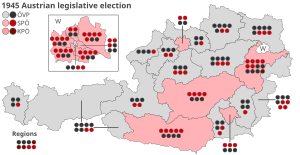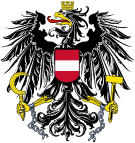1945 Austrian legislative election: Difference between revisions
ThecentreCZ (talk | contribs) |
Tags: Mobile edit Mobile web edit Advanced mobile edit |
||
| Line 40: | Line 40: | ||
}}{{Politics of Austria}} |
}}{{Politics of Austria}} |
||
Parliamentary elections were held in [[Austria]] on 25 November 1945, the first after [[World War II]]. The elections were held according to the Austrian election law of 1929, with all citizens at least 21 years old eligible to vote,<ref>[https://news.google.com/newspapers?id=e1ksAAAAIBAJ&sjid=AcsEAAAAIBAJ&pg=1544,2170446 ''Herald Journal'' - 24 November 1945 (Google News)], retrieved 19 May 2010</ref> however former [[Nazism|Nazis]] were banned from voting, official sources putting their numbers at around 200,000.<ref>[https://news.google.com/newspapers?id=0a0uAAAAIBAJ&sjid=B9wFAAAAIBAJ&dq=austria%20election%201945&pg=3987%2C3895913 ''Ottawa Citizen'' - 23 November 1945 (Google News)], retrieved 19 May 2010</ref> |
|||
The [[Austrian People's Party]], comprising elements of the prewar [[Christian Social Party (Austria)|Christian Social Party]] under the leadership of [[Leopold Figl]], won a decisive victory, receiving just under half of the vote and 85 of the 165 seats in the National Council. With an outright majority of two seats, the ÖVP could have governed alone. However, Figl retained the three-party [[grand coalition]] alongside the [[Social Democratic Party of Austria|Socialists]] and [[Communist Party of Austria|Communists]]. The Communists, who had been equally represented in the government of Figl's predecessor, Socialist [[Karl Renner]], since the end of the war, only received one cabinet post.<ref>[http://www.bka.gv.at/site/5957/default.aspx Federal Chancellery of Austria - Austrian Chancellors and Cabinets since 1945] {{webarchive|url=https://web.archive.org/web/20131226120614/http://www.bka.gv.at/site/5957/default.aspx |date=2013-12-26 }}, retrieved 19 May 2010</ref> |
The [[Austrian People's Party]], comprising elements of the prewar [[Christian Social Party (Austria)|Christian Social Party]] under the leadership of [[Leopold Figl]], won a decisive victory, receiving just under half of the vote and 85 of the 165 seats in the National Council. With an outright majority of two seats, the ÖVP could have governed alone. However, Figl retained the three-party [[grand coalition]] alongside the [[Social Democratic Party of Austria|Socialists]] and [[Communist Party of Austria|Communists]]. The Communists, who had been equally represented in the government of Figl's predecessor, Socialist [[Karl Renner]], since the end of the war, only received one cabinet post.<ref>[http://www.bka.gv.at/site/5957/default.aspx Federal Chancellery of Austria - Austrian Chancellors and Cabinets since 1945] {{webarchive|url=https://web.archive.org/web/20131226120614/http://www.bka.gv.at/site/5957/default.aspx |date=2013-12-26 }}, retrieved 19 May 2010</ref> |
||
Revision as of 21:39, 9 September 2022
| |||||||||||||||||||||||||||||
165 seats in the National Council of Austria 83 seats needed for a majority | |||||||||||||||||||||||||||||
|---|---|---|---|---|---|---|---|---|---|---|---|---|---|---|---|---|---|---|---|---|---|---|---|---|---|---|---|---|---|
| |||||||||||||||||||||||||||||
 Results of the election, showing seats won by constituency and nationwide. Constituencies are shaded according to the first-place party. | |||||||||||||||||||||||||||||
| |||||||||||||||||||||||||||||
| This article is part of a series on the |
| Politics of Austria |
|---|
 |
Parliamentary elections were held in Austria on 25 November 1945, the first after World War II. The elections were held according to the Austrian election law of 1929, with all citizens at least 21 years old eligible to vote,[1] however former Nazis were banned from voting, official sources putting their numbers at around 200,000.[2]
The Austrian People's Party, comprising elements of the prewar Christian Social Party under the leadership of Leopold Figl, won a decisive victory, receiving just under half of the vote and 85 of the 165 seats in the National Council. With an outright majority of two seats, the ÖVP could have governed alone. However, Figl retained the three-party grand coalition alongside the Socialists and Communists. The Communists, who had been equally represented in the government of Figl's predecessor, Socialist Karl Renner, since the end of the war, only received one cabinet post.[3]
On 20 December 1945 the Federal Assembly unanimously elected incumbent Chancellor Renner as President. Renner swore in Figl as new chancellor on the same day.[4][5]
The Communists won only four seats, which some blamed on the conduct of the Red Army in the Soviet occupied zone of Austria.[6] This proved to be the beginning of a long decline for the Communists, though they stayed in the chamber until May 1959.
Results
| Party | Votes | % | Seats | |
|---|---|---|---|---|
| Austrian People's Party | 1,602,227 | 49.80 | 85 | |
| Socialist Party of Austria | 1,434,898 | 44.60 | 76 | |
| Communist Party of Austria | 174,257 | 5.42 | 4 | |
| Democratic Party of Austria | 5,972 | 0.19 | 0 | |
| Total | 3,217,354 | 100.00 | 165 | |
| Valid votes | 3,217,354 | 98.89 | ||
| Invalid/blank votes | 35,975 | 1.11 | ||
| Total votes | 3,253,329 | 100.00 | ||
| Registered voters/turnout | 3,449,605 | 94.31 | ||
| Source: Nohlen & Stöver[7] | ||||
References
- ^ Herald Journal - 24 November 1945 (Google News), retrieved 19 May 2010
- ^ Ottawa Citizen - 23 November 1945 (Google News), retrieved 19 May 2010
- ^ Federal Chancellery of Austria - Austrian Chancellors and Cabinets since 1945 Archived 2013-12-26 at the Wayback Machine, retrieved 19 May 2010
- ^ President of Austria - Dr. Karl Renner Archived 2011-05-14 at the Wayback Machine, retrieved 19 May 2010
- ^ Herald Journal - 21 December 1945 (Google News), retrieved 19 May 2010
- ^ The Sydney Morning Herald - 27 November 1945 (Google News), retrieved 19 May 2010
- ^ Dieter Nohlen & Philip Stöver (2010) Elections in Europe: A data handbook, pp213–219 ISBN 9873832956097





